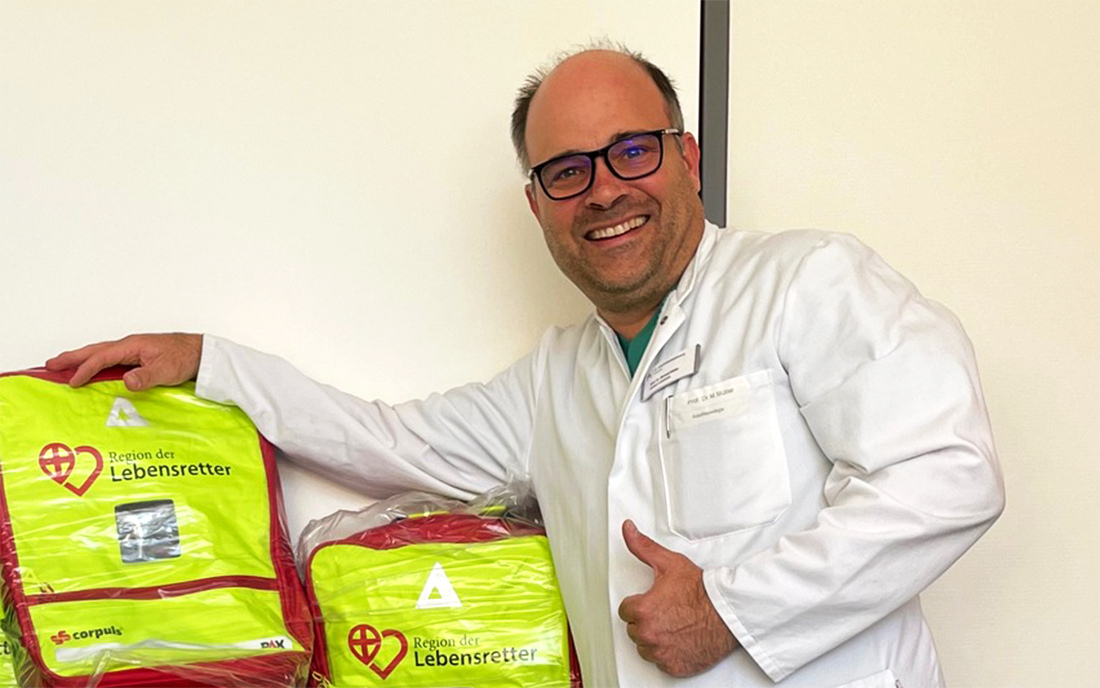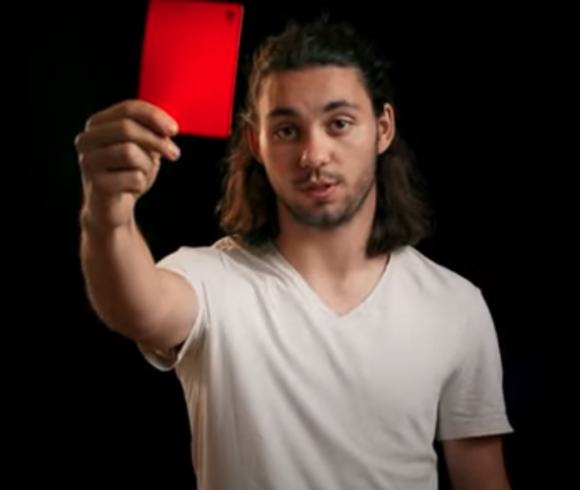“Every single person who is allowed to lead a normal life after a cardiovascular arrest motivates us in the project” – Interview with Michael Müller

Cardiac arrest can happen to anyone and the chances of survival are slim. Emergency physician Michael Müller has successfully launched a smartphone-based system that involves qualified first-aiders.
Prof. Dr Michael Müller has been Head of the Department of Anaesthesiology, Intensive Care and Emergency Medicine at St. Josef’s Hospital in Freiburg since 2015. Along the way, he has learnt all areas of emergency medicine from the ground up. The subject of resuscitation still occupies him to this day. Cardiovascular arrest can happen to anyone and the chances of survival are slim. All too often, he has seen professional help arrive too late in the event of a cardiac arrest, as chest compressions have to be started immediately. His aim is to minimise the resuscitation-free interval by alerting qualified volunteer first aiders near the scene of the accident via a smartphone app.
What problem do you solve with Region der Lebensretter/FirstAED? Why exactly does it need your solution?
70,000 people suffer cardiovascular arrest in Germany every year and only one in ten survives. The survival rate could be at least twice as high if resuscitation was started before the arrival of the emergency services. We operate the largest first aid system in Germany with the aim of alerting qualified volunteer first responders near the scene of an emergency via our smartphone app and organizing the rescue chain digitally.
What did you do before you started Region der Lebensretter?
I trained as a paramedic with the German Red Cross on a voluntary basis and worked in the ambulance service for a long time. After my medical studies, I completed further training to become a specialist in anesthesia. Among other things, I worked as an emergency physician in the rescue service and in air rescue, and I was scientifically involved in resuscitation for many years. Since 2015, I have been head of the Clinic for Anesthesiology, Intensive Care and Emergency Medicine at St. Josef’s Hospital in Freiburg.
What or who motivated you to become a social entrepreneur?
During my commitment to resuscitation, I had to learn that professional help usually comes too late because cardiac massage has to be started after 3-5 minutes. Inspired by a project in Denmark, I wanted to establish a system in Germany that integrates qualified people into the rescue chain on a voluntary basis so that many additional people can be saved.
Which of your successes do you remember most?
I personally know many people who have survived through our system. Every single person who is allowed to lead a normal life after a cardiovascular arrest motivates us in the project. And we are also constantly experiencing great successes in the further development of the system. This year, for example, we developed a new alerting algorithm. Then, in a study, we found that it gets our first responders to the scene another 1 minute earlier.
Were there any moments that were particularly challenging and what did you learn from them?
The biggest challenge is to turn an idea for improving the system into a feature that produces the desired result in practice. And that’s where we also experience incredibly exciting moments at the same time, because we achieve very good results in the collaboration between emergency medical experts, scientists and programmers.

© Region der Lebensretter
„70,000 people suffer cardiovascular arrest in Germany every year and only one in ten survives. The survival rate could be at least twice as high if resuscitation was started before the arrival of the emergency services.“
— Michael Müller, 1st Chairman of Region der Lebensretter
Where should the journey go in the future and what are the next big goals?
We are never finished, we want next year to be better than this year. And we want to achieve that in the whole of Germany, qualified resuscitation is started within less than 5 minutes for every person who suffers a cardiovascular arrest. And that defibrillation takes place before the arrival of the rescue service, so that we could save many thousands of additional people every year.
What do you wish you had known before launching your project/company? What advice would you give to others along the way?
1. There is incredibly good IT support for non-profit projects. It’s a great way to work in decentralized teams with lots of volunteers. 2. Never be afraid to ask companies for support. 3. Press and public relations and communication can be learned.
What podcast do you listen to regularly? What book is an absolute must-read for you personally?
Podcasts: Very alternating. Book: Dan Ariely: Predictably Irrational
What are your tips for doing good in everyday life? And where do you perhaps find it rather difficult to live sustainably?
Set doable goals! And I find it hard to cycle in the rain …
Complete this sentence: The world needs more…
… People who live their visions and put their ideas into practice.
Is there anything else you would like to say?
I wish that we can get a grip on the REAL problems in this world and work in a solution-oriented way. We can do it.
Every month, we interview interesting entrepreneurs and focus on their personal stories. The interviews are intended to inspire, motivate and encourage people to put their own ideas into practice.
Do you know any social entrepreneurs with an inspiring story that we should interview? Then write to us!
Andrea Rebensburg, GOOD Impact Portfolio: andrea@good-search.org
We support FirstAED/Region der Lebensretter in November 2023 with the proceeds of GOOD. Find out more on the project page:
